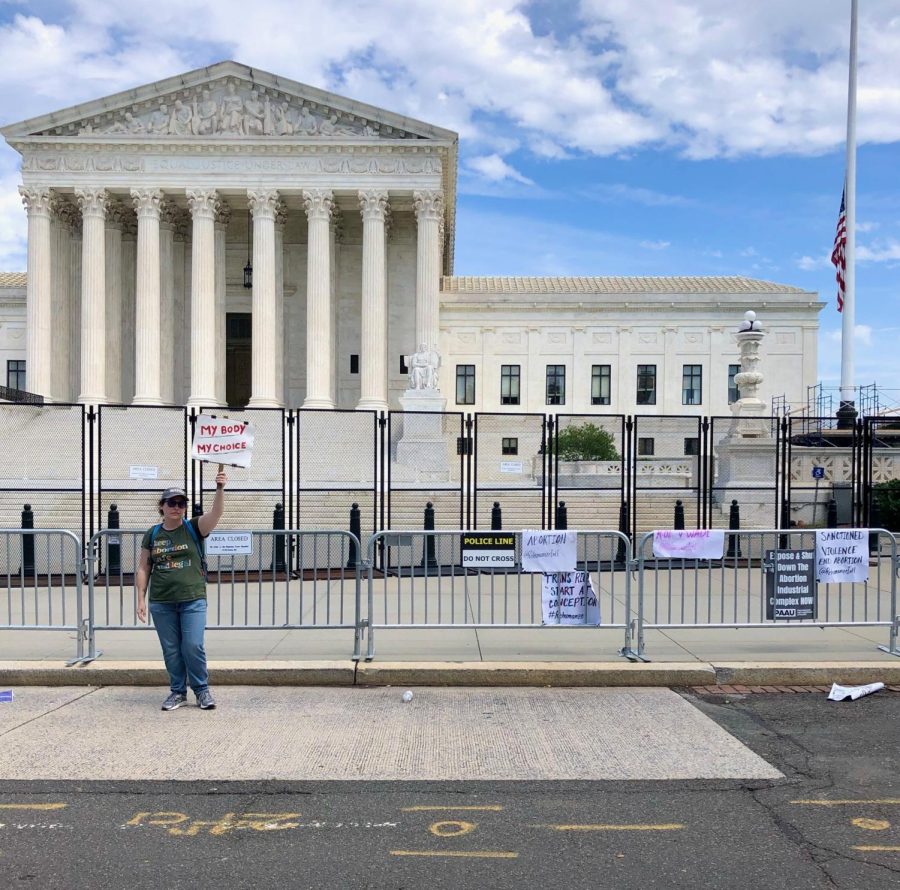Opinion: A Rare Breach in Supreme Court Secrecy Reveals a Threat to Roe v. Wade
A protestor outside the Supreme Court protests against Alito’s draft opinion.
May 23, 2022
A ninety-eight page document that was leaked by Politico on May 2 reveals that Justice Samuel Alito is attempting to overturn Roe v. Wade, a revolutionary Supreme Court case that gives women the fundamental right and ability to receive an abortion without excessive government restriction. The possibility of this case being overturned is a direct threat to women’s reproductive rights.
Forty-nine years ago in 1970, Norma McCorvey (under the name of Jane Roe in court documents to protect her identity) filed a lawsuit against Henry Wade, the district attorney of Dallas County. The lawsuit challenged a Texas law determining that abortion was illegal with the exception that a doctor approved the medical procedure to save a woman’s life.
The court questioned if a woman’s right to terminate her pregnancy by abortion is recognized in the Constitution. The opinion of the 7-2 majority of the court concluded that the right to abortion was found in the 14th Amendment (the right to privacy), and additionally the 1st, 4th, 5th, and 9th Amendments. The Fourteenth Amendment states that “no state shall make or enforce any law which shall abridge the privileges or immunities of citizens of the United States,” in the Constitution. Likewise, the 9th Amendment protects the right to obtain an abortion by defending unenumerated rights.
The two Supreme Court Justices that voted against the right to abortion were Justice Byron White and Justice William Rehnquist, who both also voted in opposition to abortion in Casey v. Planned Parenthood, another landmark case concerning a woman’s right to terminate a pregnancy. All justices who voted in Roe v. Wade concerning women’s reproductive rights were male.
The outcome of the case established that state laws banning abortion were unconstitutional, and that women have the right to obtain an abortion. Any regulations imposed on abortion now consider both a woman’s health and the potentiality of human life. The state would not be able to impose any regulations in the first trimester of pregnancy, however in the second trimester, an abortion may only occur in relation to maternal health. In accordance with Roe v. Wade, once a fetus reaches a point of “viability” in the third trimester, abortions are typically prohibited with some exceptions of extreme medical concerns.
Viability is when a fetus has the capability to survive outside the womb without artificial support. This point in gestation typically reached around twenty-four weeks. It has posed a large significance in determining the laws regarding abortion.
The Supreme Court, which prides itself on protecting the confidentiality of its internal deliberations, confirmed that the draft opinion to overturn Roe v. Wade in a pending case was authentic, but emphasized that it does not represent a final decision. Never before in modern history has a SCOTUS fully-formed draft opinion been disclosed to the public. A chief justice believes that a law clerk is responsible for this breach of information.
Throughout his nearly one hundred page initial draft, Justice Alito argues that the original outcome of Roe v. Wade was a deeply flawed decision. One of the main arguments discussed in his writing is that the case formulated a right that was nowhere found in the Constitution, although Justices had formerly argued that a right to privacy also extended to pregnancy. Justice Alito states the Due Process Clause in the Fourteenth Amendment upholds rights that are not explicitly recognized in the Constitution, but that they must be rooted in the history and tradition of the Nation. He argues that the right to abortion is not upheld under this definition.
Under this reasoning, unenumerated rights must be strongly rooted in the nation’s history and tradition in order to be considered a legitimate constitutional right. However, this reasoning directly contradicts several of the Supreme Court’s recent rulings, such as Obergefell v. Hodges, which protects the right to same-sex marriage. If Roe v. Wade were to be overturned, what could this mean for other unenumerated rights, such as gay marriage, that are protected by the Fourteenth Amendment?
Justice Alito wrote that the draft concerned only the constitutional right to abortion, and no other right. He emphasized that no other precedent case would be challenged by the initial draft, however, the question still remains as to why he gets to select what the Due Process clause does and does not apply to.
If Roe v. Wade is overturned, it would pose an incredible threat to women’s abortion rights nationwide according to stare decisis. Understanding the concept of stare decisis is essential in order to comprehend the impact Roe v. Wade has on all laws and regulations regarding abortion. The legal principle originates from Latin and means “stand by things decided.” It determines points in litigation according to a principle or rule established in a previous legal case, making the legal case a precedent.
Roe v. Wade is one of the core examples of stare decisis that serves as a precedent for state laws across the nation to be based off of. The opinion statement written and delivered by Justice Harry Blackmun for the majority of the court concluded that the Constitution protects a pregnant woman’s liberty to receive an abortion without excessive government restriction. However if the case were to be overturned, Roe v. Wade, which would have previously restricted government bans on abortion according to a right not explicitly stated in the Constitution, would no longer be a precedent case that would have the power to decide or protect subsequent cases or legal issues.
A common misconception with the ongoing dispute concerning Roe v. Wade is that if the case were to be overturned, abortion would be banned across the country. The overturning would mean that it would be left to states to decide whether abortion should remain a right, due to the Supreme Court not recognizing it in the Constitution.
Certain states have unenforceable laws that may achieve enforceability in the future if a change in circumstances were to occur, nicknamed trigger laws. The overturning of Roe v. Wade would mean that the Constitution does not recognize abortion as a right. There would be no precedent case in place to prevent states from placing severe regulations on abortion, or simply ban it altogether. Twenty-three states have currently unenforceable laws that would restrict the legal status of abortion if the case were to be overturned. Thirteen states with trigger laws enacted would automatically ban abortions completely, but many states will still choose to protect the right.
Opposition towards Roe v. Wade has always existed since the case was first presented. This opposition hasn’t posed a threat towards women’s reproductive rights until recently, when the Supreme Court gained a majority of Republican justices.
Before the highly unusual breach of information, oral arguments in December convinced the four other Conservative-appointed justices to vote along with Justice Alito in the conference. Three of the four Conservative Supreme Court Justices were appointed by President Trump during his presidency (Neil Gorsuch, Brett Kavanaugh and Amy Coney Barrett), offsetting the previous ratio the court held with a majority of Liberals, and replacing it with 6-3 ratio.
While Chief Justice John Roberts has previously voted along with Conservative judges, it is unclear what side he will take. In 2020, he voted along with liberal jurists to block a Louisiana law that would impose heavier regulations on abortion.
Whether Roe v. Wade will be overturned or not is still left uncertain, but with the decision due by the end of June, the ominous threat that some states will strip women of their reproductive rights still lingers.



